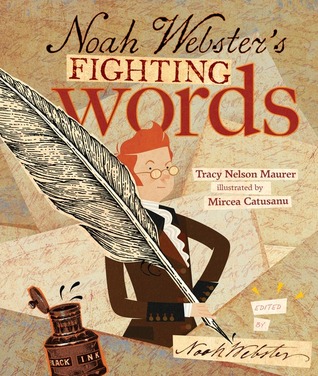
Illustrator Mircea Catusanu rose to the challenge of depicting an historical figure in a way that would hold the interest of today's youngsters. She describes her method in the Illustrator's Note and explains the materials she used, including excerpts from "books, newspapers, and Noah's original handwritten letters." This collage approach gives the illustrations a fresh contemporary feel. Details like the students throwing paper wads in class add humor in much the same Noah's editorial remarks add to the text. One of my favorite illustrations is the image of Noah holding a musket. His figure is larger and is superimposed over a background of many colonial figures holding their weapons. But the barrel of Noah's musket is actually a large pen!
The creators of this book have managed to take what could easily have been a boring explanation of the first American Dictionary and made it as easy and entertaining to read as a piece of fiction. For anyone who may worry that the book does not have its facts straight - there are a timeline, list of sources, a selected bibliography, list of primary sources, and suggestions for more information.
Classes studying dictionary skills, famous writers, or the Colonial period of American history could all benefit from reading this delightful account of Noah Webster and his efforts to make American English separate and distinct from the English of Great Britain. Readers who enjoyed Lane Smith's comical John, Paul, George, and Ben, will find this book similarly appealing.
I read an e-book provided by the publisher through NetGalley.
No comments:
Post a Comment